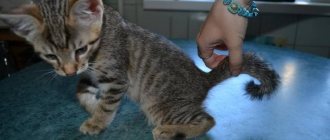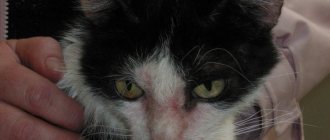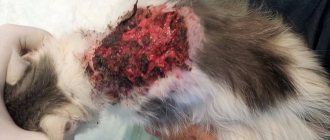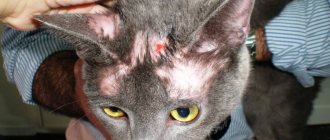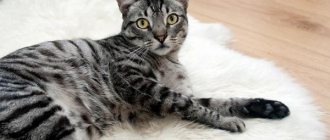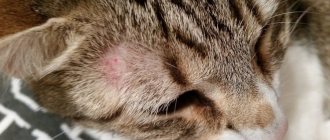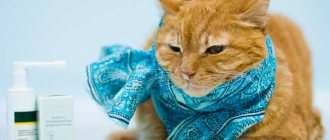The role of vitamins and microelements is very important for the life of any living organism, be it a person or a pet. But in practice, creating a balanced diet for a cat is not so easy. The off-season period is especially difficult for animals: spring and autumn.
Unfortunately, even balanced food that can be purchased in a store does not guarantee the elimination of problems with vitamin deficiency in cats. Various biological substances will help avoid unnecessary illnesses in the pet and worries for the owners.
Lack of vitamins often affects pregnant cats that were bred for breeding as a source of additional income. An additional risk group is purebred cats, which often require special treatment.
Vitamin deficiency in cats: general data
Domestic cats that do not go outside are completely dependent on their owner and are able to receive only those vitamins and elements that are contained in food offered by humans. At the same time, wild felines, having the ability to obtain food on their own, are able to regulate the nutrients entering the body. In addition, frequent exposure to the sun has a positive effect on animals, at least providing cats with vitamin D. Pets can only rely on the sun's rays penetrating through the window glass.
Every living organism needs vitamins in the right ratio
Please note that we are not talking about stray animals, but about free cats born and living in the wild. Domesticated animals that have lost their home and owner are in an even more deplorable state, since they are practically unable to obtain balanced and healthy food in urban conditions.
Due to a poor diet and some other factors, cats develop vitamin deficiency - a negative condition of the body in which the animal is acutely lacking in vitamins (they are absent from food or are poorly absorbed). Conventionally, we can distinguish three groups of biologically active substances that are vital for mustachioed pets.
Wild relatives of domestic cats rarely suffer from vitamin deficiency
The vitamins cats need are organic compounds responsible for the regulatory function in the body, metabolic processes and the formation and maintenance of immunity. An animal that regularly receives the necessary groups of vitamins is less susceptible to many diseases, develops correctly, and has a reduced risk of cancer and infectious diseases.
Table 1. Vitamins important for cats
| Vitamins | Group | Why are they needed? |
| B, C, U | Water soluble | Stimulate metabolism, biological synthesis |
| A, D, E, K | Fat soluble | Participants in all physiological processes in the animal’s body |
| Panthenolic acid, carotene, biotin, folic acid | Provitamins | Maintains satisfactory condition of coat, bones and connective tissue |
Your cat should get most of its vitamins from its daily diet.
The role of vitamins
Vitamins are an important element in a cat's diet. In the wild, predators obtain them mainly from the meat of prey, which they eat along with the skin, bones, feathers, if it is a bird. And a small but important part from plant foods. Partially in the form of the contents of the victim's stomach.
Pets can also get vitamins by eating their food. In expensive industrial mixtures, super premium or holistic, there are usually enough of them, these foods are balanced in composition.
With a natural diet, the cat most often does not have enough vitamins. The food that a person can offer to a pet does not contain all the elements necessary for the predator’s body. Then vitamin deficiency occurs. The animal becomes lethargic, apathetic, loses its external gloss and grooming, begins to limp, and coordination of movements is impaired.
At the same time, the body is susceptible to multiple diseases, quickly depleted, and does not have the necessary protection.
Each group of vitamins has its own functions:
- A - increases the body’s immune defense, stimulates cell renewal and growth, improves vision.
- B - responds to the proper functioning of the gastrointestinal tract, the condition of the coat and skin, and general activity.
- E is an antioxidant. The functioning of the reproductive system and the development of the fetus depend on it. Therefore, this vitamin is necessary primarily for pregnant females.
- D - necessary for the proper formation of the skeleton, joints and muscles.
- C - helps increase the elasticity of the walls of blood vessels, is responsible for the functioning of the heart muscle and joints.
- H - the condition of the cat’s skin and coat depends on it.
- K is necessary primarily to ensure blood clotting.
- Taurine is an essential amino acid that is most responsible for maintaining a cat's immune system and improving vision.
Factors causing vitamin deficiency
Veterinarians name several reasons that contribute to the development of vitamin deficiency in cats. Some of these factors play a dominant role in the onset of the disease, some play a smaller role, but taken together, each of the reasons can be compelling. A loving, responsible owner must understand that vitamin deficiency entails:
- Meager daily diet.
- Weakened immunity.
- Chronic diseases.
- Viruses, infections, injuries, pathological processes in the body.
- Unfavorable living conditions (constant low temperatures, drafts, dirty air, lack of drinking water, etc.).
- Pregnancy and the period of nursing offspring.
- Parasitic infestations (helminths, fleas).
- Permanent stressful situations, nervous system disorders.
- Diseases of the immune and endocrine system.
- Long-term use of medications, in particular antibiotic therapy or treatment with sulfonamides.
A healthy animal with a nutritious diet is not prone to vitamin deficiency
How to treat vitamin deficiency
The deterioration of the condition, if no action is taken, increases gradually. Stage 1 is latent, there are practically no symptoms, but sometimes the owner notices deviations in behavior. For example, a pet begins to chew on the plaster, peeling off the wallpaper, or periodically shows nervousness.
Knowing how to treat vitamin deficiency in a cat, the transition to stage 2 can be stopped. During it, the first signs appear, which are characteristic of many diseases. The fur begins to come out, and digestive problems appear.
At stage 3, symptoms are already pronounced. If the condition worsens significantly, you should contact a veterinarian. Self-medication is dangerous for your pet's life.
How does vitamin deficiency manifest itself in cats?
Even an attentive owner will not immediately notice that the animal suffers from a lack of vitamins. At the first stage, vitamin deficiency is practically invisible; pathological changes become visually visible only at a serious stage, when the deficiency of nutrients in the body becomes critical.
Thus, the first stage of vitamin deficiency passes latently and changes can only be seen when the animal undergoes a biochemical blood test. Therefore, regular donation of a blood sample for testing is indicated even for healthy cats - by deciphering the analysis, it is clear whether the pet receives all the vitamins.
A blood test in cats is the most accurate laboratory method for studying the state of general health and specific organs. How is the procedure performed, what indicators are considered normal? Read more in our article.
The second stage of vitamin deficiency has differentiated symptoms, that is, similar to the signs of almost any disease. The animal becomes apathetic, lethargic, loses weight, and the quality of its coat deteriorates.
A cat's appearance says a lot about its health.
The owner should be alert to the following symptoms:
- refusal of food, play, affection;
- weight loss of the animal, deterioration in wool quality;
- itching of the skin, dandruff;
- hair loss, appearance of bald patches;
- deterioration of the animal’s vision, disorientation in space at night;
- unsteadiness of gait, general weakness.
Of course, with normal animal care, it is unlikely that all these symptoms will “fall” on the animal at once and unexpectedly. However, a full set of signs can be seen in the animal when purchased, as well as in a situation where a stray cat is found on the street. Such symptoms are a reason to immediately visit a veterinarian.
Changes in the skin may indicate vitamin deficiency
As you can understand, vitamin deficiency has many external manifestations. Thus, if the cat is active, has a good appetite, responds with pleasure to the owner’s affection and an offer to play, and the animal’s fur is shiny, lies flat and looks healthy, there is no reason to suspect vitamin deficiency in the pet. If your pet is sad, its coat has lost its shine, and its overall appearance has deteriorated, it’s time to pay a visit to the veterinarian.
A consultation at a veterinary clinic is also necessary because it is impossible to determine by eye exactly which vitamins an animal lacks. If a person takes a stray animal from the street, we can talk about complex vitamin deficiency, due to the total deficiency of all useful substances in the former street cat. If the animal has always been a pet, and vitamin deficiency occurred “out of nowhere,” appropriate diagnostics are needed.
Based on the tests, you can find out what vitamins your cat lacks
A veterinarian, even one with the highest qualifications, will also not make a diagnosis simply by examining the animal. You will need to take the simplest tests - blood and urine - to determine the deficiency of a specific vitamin.
You cannot thoughtlessly include foods rich in certain substances in your cat’s diet, as well as give multivitamin complexes, without making a diagnosis. An excess of vitamins is just as dangerous for a cat’s body as a deficiency. Let's look at how organic compounds affect your pet.
Vitamins for cats are selected together with a specialist
Table 2. What does a deficiency of specific vitamins lead to?
| What vitamin is missing? | Consequences |
| D | As with any warm-blooded organism, a lack of this vitamin leads to rickets, problems with magnesium balance, and problems with the required amount of potassium, phosphorus, and calcium in the body. Cats suffering from vitamin D deficiency are prone to fractures, sprained ligaments and joints. |
| TO | Lack of vitamin K worsens blood quality, reduces hemoglobin, the number of red blood cells and platelets |
| A | Vitamin A deficiency makes the coat dull and brittle, slows down the development of the animal, causes ophthalmological pathologies, including the loss of twilight vision by the cat. Involves the development of the following pathologies: 1. Dermatitis and other skin diseases. 2. Night blindness. 3. Infertility. 4. Stress, nervous disorders. 5. Inflammation of the mucous membranes. An excess is also dangerous - the vitamin in large quantities has a negative effect on the liver and can cause anaphylactic shock or intoxication of the body |
| IN | B-vitamin deficiency can cause baldness of an animal or spot hair loss, dysfunction of the nervous system, damage to almost all systems, organs and their parts. Vitamins of this group are vital for cats. With a lack of B vitamins, the following ailments develop: 1. Anemia. 2. Convulsions, epilepsy. 3. Digestive disorders. 4. Violation of the skin and coat 5. Disorders of the heart muscle, drop in pulse. |
| WITH | Ascorbic acid is synthesized by cats independently; if this process is disrupted, dental problems arise, the immune system is weakened, and joints and connective tissues are affected. Vitamin C deficiency is dangerous due to the following diseases: 1. Loosening and loss of teeth. 2. Bleeding gums, inflammation of the oral cavity. 3. Susceptibility to viruses and infections. 4. Diseases of joints and muscles. |
| E | An antioxidant that has a powerful effect on the reproductive ability of animals. A deficiency in the body can lead to urological diseases and make it impossible for an animal to become pregnant. A deficiency of this vitamin can cause paralysis in cats. |
Joint diseases in cats: symptoms
List of products and specific signs of deficiency
Vitamin deficiency is rare in a kitten that was fully fed by a cat. If it turns out that you took an animal from the street, you should provide it with the following products: fish oil, bone meal, children's nutritional supplements. It is possible to add brewer's yeast within reasonable limits.
Before adding vitamins, of course, you should consult with a specialist who will create a diet taking into account the individual characteristics of your pet. Fat-soluble (A, D, E, K) and water-soluble (B1...12, C) vitamins should be added separately.
A
It is caused by deterioration of vision, damage to the mucous membrane, and the development of conjunctivitis, which has an unpleasant effect on the cat, as a representative of the nocturnal lifestyle. Vitamin A deficiency can lead to intestinal problems (specifically, loose stools).
An important sign of vitamin deficiency is deterioration in the condition of the skin and hair: the coat becomes dull, the skin dries out . The cat loses its external attractiveness. Products for prevention: fish oil, eggs (yolk), butter, beef liver.
IN
Vitamins B1 - thiamine and B2 - riboflavin are responsible for maintaining the nervous system and nerve signal activity. A deficiency leads to poor digestion and reduces the level of hemoglobin in the blood. Serious disorders include pathologies of pregnancy and postpartum injuries.
A problem with vitamin B1 leads to dry mucous membranes and susceptibility to infectious diseases. A lack of vitamin B6 can lead to problems with the musculoskeletal system (arthritis and urolithiasis). Possible stomatitis.
Vitamin B12 deficiency in the body will lead to poor intestinal absorption, which can lead to constipation. Leukemia, a blood clotting problem, may develop.
Products for prevention: raw meat and its by-products (liver, poultry kidneys), bone meal, dosed brewer's yeast, eggs, fermented milk products (yogurt, snowball, bifid), fresh herbs, zucchini, carrots.
IMPORTANT! Water-soluble vitamins are not always combined and can lead to complications.
For example, vitamins B6 and B12 are destroyed upon contact; B1 and B12 - vitamin B12 is partially oxidized, an overdose of such vitamins causes shock; B1 and B6 - slow down the absorption of both.
WITH
The absence of ascorbic acid leads to decreased immunity. Stomatitis develops, gums bleed, tooth loss and serious gum disease are possible.
A lack of vitamin C interferes with collagen formation, which leads to joint problems and an unsteady gait. Citrus fruits are contraindicated for cats, including in the form of purees and juices.
Products for prevention: carrots, lettuce leaves, ascorbic acid from the pharmacy, turnip or pumpkin.
D
Dangerous primarily for kittens. Due to problems with the metabolic processes of phosphorus and calcium, the animal develops rickets, bones become deformed, and the size of the joints changes. Kittens are developmentally delayed and have breathing problems.
Products for prevention: meat and dairy products (low-fat cottage cheese), egg yolk and brewer's yeast.
E
Problems with the reproduction of offspring are associated precisely with vitamin E deficiency. Chronic infertility or lethargy of sperm are the main diseases with vitamin deficiency. Pancreatitis may develop.
Products for prevention: some sea fish, fresh herbs, dairy products, premium store food.
Vitamin deficiency in cats: treatment and prevention
As such, there is no treatment for vitamin deficiency - the owner’s task is to compensate for the lack of a specific group of vitamins, based on test results. Let us remind you once again that you should not give vitamins just like that, for prevention, since an excess of vitamin substances can be even more dangerous than a deficiency.
Cats with vitamin deficiency and a normal diet are prescribed additional vitamin complexes
Once the veterinarian has received the test results, he will make mandatory appointments. If the animal is fed a natural diet, then it will be necessary to add foods rich in essential organic compounds to the food. However, products do not always contain the required dose of vitamin, so it is more advisable to purchase specific vitamin complexes or vitamins of the required group in pure form, and give the animal a course or two, depending on the doctor’s prescription.
The kitten needs to be fed correctly and in a balanced manner from the moment it stops suckling from its mother.
To prevent the problem from arising in the future, the animal’s diet must be adjusted by choosing either good industrial dry food (manufactured food does not require additional vitamin intake, since it contains all the substances necessary for a particular animal).
As a rule, at the primary stage of vitamin deficiency, it is enough to adjust the animal’s diet by switching the cat from low-quality food to super-premium or holistic food. The following brands have good reviews from owners and recommendations from veterinarians: “Savarra”, “Eagle Pak”, “Pro Plan”, “Hills”, “Monge”, “Grandorf” and the like. In the line of each brand, you can choose food for any cat, depending on its age, breed, and physiological characteristics.
Holistic-grade food does not require the introduction of other products into the diet
If the owner does not want to feed the cat with industrial food, his task is to correctly formulate natural feeding. Each animal is individual, so it is better to select the diet plan and contents together with your veterinarian. Every day, the cat should receive raw meat, poultry, sea fish or seafood, vegetables and fruits, dairy products, eggs, and herbs.
There are specific products that contain the vitamins every cat needs. Thus, vitamin A contains cod liver, egg whites, wheat germ, vitamin B is found in raw meat and fish, the lack of vitamin C is compensated by adding carrots, pumpkin, turnips, and spinach to the animal’s diet. These vegetables are given raw, finely grated and mixed with products that are more attractive to domestic predators - minced meat or fish.
Cats are carnivores, but they also need plant foods
For animals that spend all their time at home, you can grow special cat grass. The cat also needs to have a place on the windowsill so that the pet can sunbathe and receive vitamin D. Brewer's yeast also contains this vitamin.
In order for the animal to receive vitamin E, it is necessary to enrich the natural diet with vegetable oils - for example, olive. Vegetables need to be seasoned with oil; in this combination, both will be absorbed faster and better. To prevent your cat from developing intestinal upset, you need very little oil, about a quarter of a teaspoon per day.
There is no need to cook porridge with the addition of meat products for your cat - for better absorption, the animal should receive raw food, as in the wild. In addition, heat treatment destroys most vitamins and other useful macro- and microelements.
Often cats themselves feel a lack of a particular vitamin and reach for certain foods.
You cannot combine two types of feeding - dry food and natural. A cat's stomach is adjusted to one type of food, so you need to assess your strength from the very beginning. Holistic and super-premium dry food has one drawback - its rather high cost. But the advantage is much more significant - the food is already designed for the animal, and the owner does not need to select products on his own.
Natural feeding, in fact, is not much cheaper than factory-made ready-made food. Eighty percent of a cat’s diet should be protein (meat, poultry, fish, cottage cheese), and about twenty percent should be vegetables, fruits, and grains.
The first place in the food composition should be a source of protein.
Preventive actions
What to do to protect your pets from such an insidious disease as rickets:
- Responsibly approach reproduction. Select partners for your cat wisely: avoid mating sick individuals and relatives. Limit the number of cat pregnancies - no more than twice in three years.
- Organize enhanced, balanced nutrition for the pregnant cat with high-quality food.
- Walk the cat “in position” more often during the daytime.
- Follow the hygienic rules for raising kittens: maintain the required temperature and humidity in the room, arrange regular ventilation. The normal temperature for newborns is 31°C, then it gradually decreases by 4°C. Humidity – 55-65%.
- Provide young animals with adequate sun exposure.
- Feed “artificial” ones only with special high-quality mixtures for kittens.
- Wean kittens from mother's milk only at the age of 2.5 months.
- Conduct timely deworming and vaccination.
- As prescribed by the veterinarian, give vitamin-mineral complexes with microelements involved in the formation of the bone apparatus.
- Provide kittens with sufficient physical activity. Let them play with mom and other kittens. Play with them more.
Choose the best toys so that kittens can play more.
Remember that rickets (hypovitaminosis D) is often the result of insufficient attention to furry pets. This disease does not forgive human carelessness and negligence. If left unattended, it progresses quickly and can lead to sad irreversible consequences.
Video
Vitamin deficiency in cats occurs if the owner adheres to a diet and feeds the fluffy with the same limited amount of food, believing that it is healthy for him. Chronic diseases diagnosed in animals also cause vitamin deficiency. A healthy pet rarely spends time in the fresh air and can only soak up the sun on the balcony in the summer, so it also needs to be given tablets regularly.
Purebred cats are more often susceptible to vitamin deficiency; many of them have weakened immunity and require constant support. Also, perpetually pregnant cats, for example, stray or domestic unsterilized cats that were brought in as a permanent source of income, also suffer from a lack of useful microelements. The purr's resources are eventually exhausted, and the furry one begins to mope, looking lethargic and weak, passive.
Vitamin supplements for cats
The veterinary market offers a great variety of vitamins for cats, suitable for any budget. Below we will look at the highest quality and most popular vitamin preparations prescribed by veterinarians.
Table 3. Cat vitamins
| Name | Description | approximate cost |
Excel Bravers Yast | Food supplement containing brewer's yeast, garlic extract, zinc, stearic acid, safflower oil and tuna oil. Rich in B vitamins. Improves appetite, stimulates the immune system, improves coat quality, cares for the skin, prevents liver diseases | 350 rubles for 260 tablets |
Beafar Top 10 Kat | A multivitamin complex that strengthens the animal’s immune system and compensates for the deficiency of minerals, vitamins and taurine. Has a pleasant taste, suitable for cats of any age | 500 rubles for 180 tablets |
Anivital Feliimmune | Contains vitamin C, iron, glycan, brewer's yeast, vitamin E, choline and folic acid. Promotes protein metabolism, protects the immune system, improves overall clinical health | 1250 rubles for 140 tablets |
Beafar Kitty Mix | Complete vitamins, which include vitamin C, B, E, iron, taurine, phosphorus, sodium, lecithin, biotin and calcium. Stabilizes heart function, improves the structure and appearance of the coat, has a beneficial effect on the immune system | 330 rubles for 180 tablets |
Kanina Kanivita | Vitamins in liquid tonic form containing gamma-linoleic acid, vitamins A and E. Lowers cholesterol levels, improves metabolism, relieves inflammation, improves coat quality, improves the functioning of the immune system | 850 rubles per 100 milliliters |
Polydex Immunity Up | Multivitamin complex containing manganese, copper, taurine, iron, iodine, vitamin groups B, A, C, E, D. Increases the activity of animals, has a good effect on immunity, general health, quality of skin and coat, metabolism | 450 rubles for 200 tablets |
Video - How to choose vitamins for a cat?
What is rickets
Rickets is a systemic pathology characterized by impaired mineralization of bones, which leads to their softening and deformation. The disease signals metabolic disorders, deficiency of nutrients and vitamins in the body. Rickets in pets can be congenital or acquired. The acquired form most often occurs due to the fault of the owners and is associated with violations of the feeding regime and system, the use of low-quality feed, and poor nutrition.
As a rule, young animals, kittens up to one year old, suffer from rickets. In adult cats, if the disease is not eliminated at an early age, only characteristic consequences can be noticed. Therefore, the sooner the owner identifies signs of rickets, the greater the chances for a complete recovery of the furry pet.
Important! Kittens suffering from rickets look weakened, lethargic, and noticeably lag behind their brothers and sisters in growth and development. Kids refuse active games and are reluctant to make contact with their owners and relatives.
Prevention
Prevention of vitamin deficiency is achieved by consuming factory-made food, limiting the pet's treats with human delicacies, timely disinfestation, anthelmintic treatment, and vaccination.
The cat needs to be given the opportunity to spend more time outside. There she herself will find sources of vitamins for herself.
We invite you to join our Zen channel and group on VKontakte or Odnoklassniki, where new articles for pet owners are published.
Similar articles:
- If your cat has food allergies
- Ringworm Caution: What Pet Owners Need to Know
- Why are cats overweight?
Diagnostics
The disease is highly treatable and correctable in the early stages. Do not try to cure the disease yourself, especially acquired rickets, since the consequences are very serious for the health of animals.
The analysis is based on clinical symptoms, anamnesis, serological, radioisotope studies, X-ray results, ultrasound. In biochemical analysis, a sharp decrease in calcium, phosphorus in the blood, and clotting disorders are noted. X-ray images clearly show curvatures, thickenings, deformation of bone structures, growths, inflammation joints.
Complete recovery of animals is possible only at the initial stage of development of the disease. Treatment of rickets is selected individually, depending on the stage, severity of the disease, age, and the main root cause.
If rickets is caused by calcium deficiency, droppers with gluconate and calcium chloride will help cure rickets in a kitten.
Vitamin D is prescribed (oil, alcohol solutions). 200-210 IU is administered subcutaneously or 8-10 drops of Tetravit . Additionally, vitamins of group B, A, E in injection solutions, tablets, as well as fish oil two to three times a week.
To improve metabolic processes and general condition, trimetazidine and bonormalizer . For inflammation of the joints, chondroitin and glucosain are prescribed.
If cardiac activity is impaired, cardiac glycosides, drugs containing magnesium, drugs that normalize blood supply are prescribed. Enzymes (mezim, pancreatin) are prescribed to normalize digestion, and symptomatic drugs.
Diet
The diet is adjusted, a special diet is prescribed, and therapeutic and prophylactic fortified food is prescribed.
Important! Only after normalization of the digestive tract in animals diagnosed with rickets can the disease be overcome. The kitten will recover as soon as its metabolism normalizes and the absorption of vitamins, minerals, and amino acids improves.
If kittens are bottle-fed, special mixtures and ready-made food for young animals are used to feed them. If necessary, nutrition is supplemented with preparations containing phosphorus and calcium. The dosage is calculated according to the weight of the kitten.
If your pet is kept on natural food, supplement the diet with vitamin and mineral supplements and vitamin preparations. Give your cat fermented milk, dairy products (yogurt, kefir, calcined cottage cheese), well-cooked porridge, boiled yolk, boiled chicken, veal. Give your animal fresh greens and grains.
With a ready-made diet, feed the kitten with “extra” and “super-premium” food, taking into account the age, activity level, and needs of your pet. Don't forget that there should always be fresh drinking water in the kitten's bowl. Avoid dehydration.
Treatment
The information available on the Internet about the use of individual feeds as a source of vitamins is of no practical interest. The use of numerous nutritional supplements should be used with caution to avoid causing hypervitaminosis. An excess of biological catalysts is no less dangerous than a deficiency. Before using this or that product, you should consult a doctor. Injection sources are most often used - Multivit, Ultravit, Gamavit.
If dysbiosis occurs, restorative therapy is carried out using probiotics.
Gamavit
Symptoms
Lethargy and depressed state of the pet is considered a common phenomenon. Signs of deficiency of lipophilic and water-soluble catalysts are not the same.
Symptoms of fat-soluble vitamin deficiency
The following vitamin deficiencies are distinguished:
- A. Retinol deficiency is accompanied by growth retardation, pathologies of the mucous membranes, keratitis develops, and the cat loses the ability to see in the dark. Reproductive functions suffer.
- D. Calciferol deficiency leads to rickets and hormonal imbalances.
- E. Tocopherol deficiency is manifested by disorders of reproductive functions. Infertility develops.
Symptoms of water-soluble vitamin deficiency
A common symptom of B-catalyst deficiency is dermatitis and hair loss. The following vitamin deficiencies are distinguished:
- B1. Nervous phenomena, unsteady gait, paralysis, convulsions, complications during lambing.
- B2, B5, B6. Dermatitis, convulsions, anemia.
- B9. Folic acid is involved in the synthesis of red blood cells; its deficiency leads to anemia.
- B12. Cyanocobalamin is a component of Hemoglobin. Deficiency causes anemia, colic, dysfunction of the liver and spleen.
- C. Ascorbic acid deficiency makes blood capillaries fragile. Joints and mucous membranes suffer, gums swell. The immune system is weakened, the cat becomes vulnerable to diseases.
- K. Synthesized in the large intestine. With dysbacteriosis caused by long-term antibiotic therapy, the production of Phylloquinone stops. Blood clotting decreases, bleeding occurs that is difficult to stop.
Causes
Deficiency symptoms develop for the following reasons:
- Unbalanced diet.
- Failure to comply with the rules for the use of feed and food additives.
- Impaired absorption.
- Consumption of substances that destroy vitamins.
- Increasing need for biological catalysts.
Vitamin deficiency is a sad disease
Unbalanced diet
The cat's diet consists of components that are a source of energy - lipids, carbohydrates, protein, and excipients that do not contain calories. Catalysts belong to the latter; their digestibility depends on the optimal ratio of the former.
When the diet is low in fat, lipophilic vitamins cannot be absorbed from the intestines because they do not dissolve in water. Excess triglycerides interfere with the absorption of hydrophilic catalysts. The body seeks to get rid of excessive amounts of lipids by increasing peristalsis. Together with fecal matter, both types of vitamins rush out.
Using prepared food does not solve all problems. For each age and physiological state, taking into account the breed, specific ready-made food is required, containing different amounts of vitamins.
Hair loss due to vitamin deficiencies
Failure to comply with the rules for the use of feed and food additives
Animal owners rarely pay attention to the rules for storing food. Catalysts are chemical compounds that react with other components. High humidity and temperature shorten shelf life. Fish oil is undeservedly popular among fellinologists. If storage rules are violated at all stages, including being in the veterinary department, pharmacy, or at home, triglycerides go rancid, forming toxic compounds.
Malabsorption
The use of human food interferes with the absorption of food components. The multiplied helminths themselves secrete and require catalysts. Fellinologist, trying to stop diarrhea, uses sorbents that bind vitamins.
Consumption of feed that destroys vitamins
The entrails of river fish contain thiaminase, which decomposes B1. Spoiled foods are rich in peroxides, which inactivate catalysts.
Grazing saves you from vitamin deficiency
Increasing need for biological catalysts.
An increased consumption of nutritional components, especially biologically active ones, is observed during gestation, lactation, intensive growth, illness or recovery.
